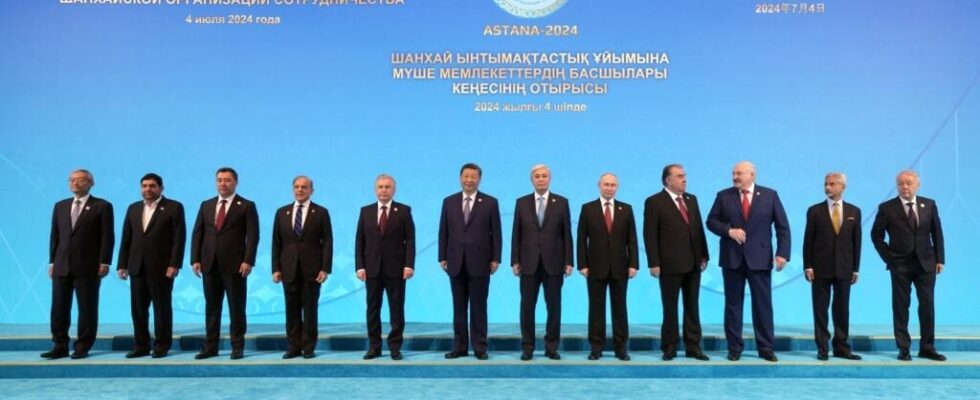The leaders of the nine member states – China, Russia, Iran, India, Kazakhstan, Kyrgyzstan, Tajikistan, Uzbekistan, Pakistan – of the Shanghai Cooperation Organization are meeting on July 3 and 4 in Astana, Kazakhstan. This gathering of countries was originally intended to counter the Western presence in the region, but has gradually moved away from defense issues and continues to expand its influence, as illustrated by the presence of Recep Tayyip Erdogan who came as an observer to this 24th summit. We asked three questions to Bayram Balci, a researcher at the international research center of Sciences-Po, specializing in Turkey and Central Asia.
4 min
RFI: What is Turkey seeking by going to the Shanghai Cooperation Organization summit to meet Xi Jinping, Vladimir Putin and the heads of state?ECentral Asian state?
Bayram Balci : The objective of Recep Tayyip Erdogan It is to raise the stakes, to place its marbles everywhere to show the West that Turkey is capable of being so courted, of having things to receive or to propose to other partners. The Shanghai Cooperation Organization, for Turkey, is a way of showing that it has an increasingly sovereign foreign policy, that it is not obliged to be completely linked to the West. For him, it is a way of maximizing gains. On the other hand, entry into this club as a member state of the Shanghai Cooperation Organization would be something quite serious. Is that compatible with Turkey still in NATO? Difficult to say. In my opinion, it is mainly showing that it is an actor who counts.
Russia and China are the two key players in this organisation, how do their influences coexist in Central Asia?
There is a kind of sharing of interests between China and Russia in Central Asia. That is, Russia continues to give absolute priority to everything that is security, military, defense, and also a little bit to the energy sector. For the rest, in terms of trade and economy, it is not able to compete with China. The feeling is that Beijing takes care of the economy and Moscow of defense. We see that China does not have a military base in Central Asia, but it is not seeking to have one either. What it wants is to obtain cooperation agreements with these different member states, for them to stop supporting the Uighur separatistsand that they allow it to implement its strategy of New Silk Roadsand to export its products. On the other hand, if Russia does not take an interest in these political and economic issues, it could also lose its advantage on defense issues. For the moment, there is a distribution of interests, but in the long term, Russia may end up being the loser.
Is Russia suffering from its status as a former colonial power in this region?
Very clearly, we can draw a parallel with the feeling that former colonial powers like France can provoke in Africa. For the countries of Central Asia, it is very important to show that there are other actors besides Russia. They are asking for cooperation with China, Turkey, but also the West, the United States, the European Union. This allows them to have genuine sovereignty vis-à-vis Russia. For example, no country in Central Asia has provided direct support to Russia, in certain international forums they have assured that they respect the sovereignty and territorial integrity of Ukraine. They do not recognize Russia’s puppet republics – Donetsk and Lugansk -. It is impossible for them, because it would be giving a green light to Vladimir Poutine so that in the following years it will do the same thing in Central Asia. However, these countries do not gain anything by going directly to confrontation with Russia, even if it is restrictive, that it is a symbol of colonization, of exploitation, it remains a partner that these countries need. If only for the number of migrants from these countries who go to work in Russia. They do not apply Western sanctions against Russia either, because they have no economic interest in doing so.
Read alsoMichael Levystone: “Central Asia has become a hub for East-West trade”
